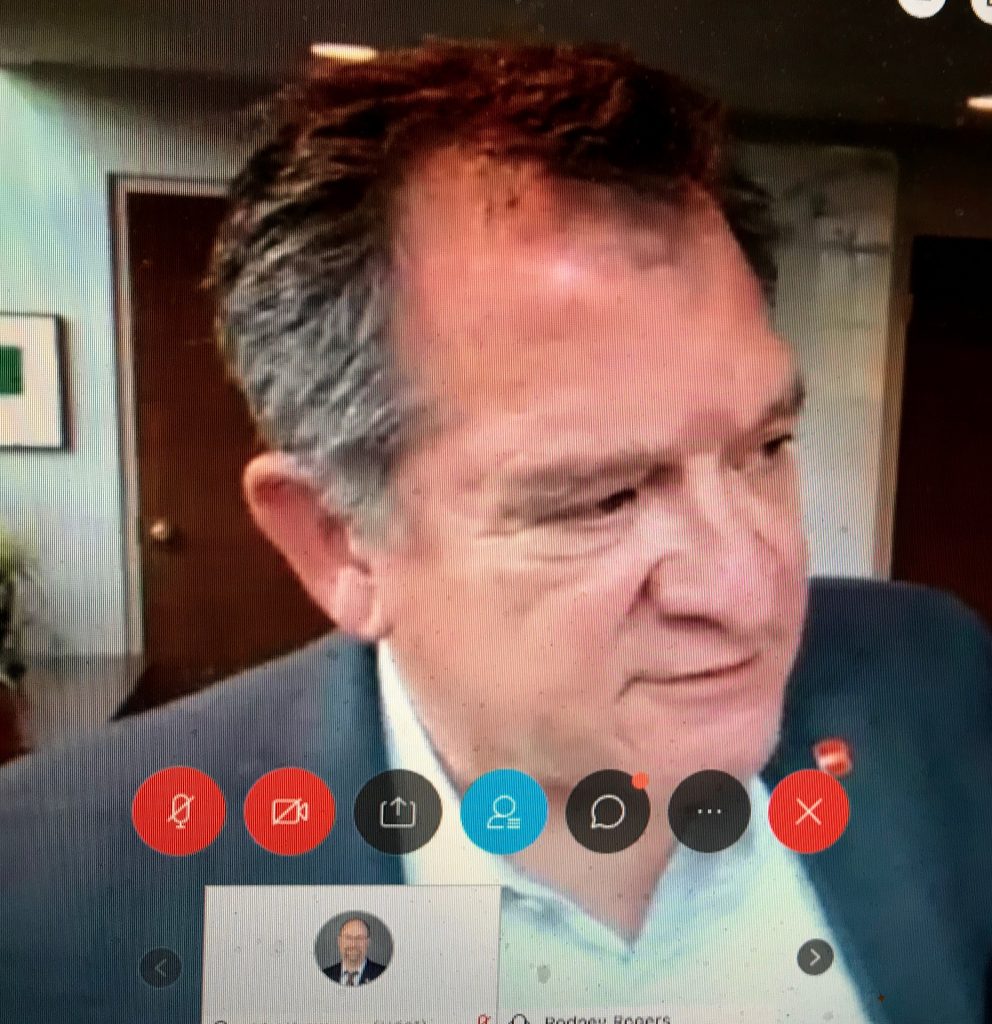By DAVID DUPONT
BG Independent News
Tough times lie ahead for Bowling Green State University.
As the university weathers the COVID-19 pandemic, uncertain when students can return to classrooms on campus, it is facing unprecedented financial difficulties.

That was the frank assessment provided by President Rodney Rogers to Faculty Senate on Tuesday.
The session was held over WebEx video conferencing.
Rogers acknowledged that everyone is touched by the pandemic, and he called the faculty’s efforts to move to online teaching “heroic.”
Four weeks ago, none of them thought they’d have to present their classes that way. Now they all are. That will continue through the summer. And, he indicated, possibly beyond.
But 60 of those faculty, Qualified-Rank Faculty, those who are not on the tenure track with one to three years of service, are facing job losses. After initially sending them renewal letters in March, the university has extended the date by which it will notify them if they’ll be teaching in fall.
What is certain is that the university is facing dramatic cuts in funding. Gov. Mike DeWine has already signaled that the state will cut its funding for the next quarter by 20 percent. That will cost BGSU $4 million. Funding for next year is expected to be cut by 20 percent, $16 million for BGSU. This does not include the cost of refunding room and board fees to students. That could be $15.5 million, the university’s chief financial officer Sheri Stoll said last week.
Rogers said the university is entering this period in a position of strength financially, but that could erode in a few months.
The university has already put a freeze on hiring and non-essential spending.
Rogers said that everything the university is not contractually obligated to do is on the table.
These fiscal adjustments will have to be made quickly, Rogers said. Because of the aggressive approach the state has taken to combat the coronavirus pandemic, including closing businesses and telling people to stay at home, it is hemorrhaging tax revenue.
Provost Joe Whitehead said that there’s uncertainty over how many students will attend BGSU next year.
The incoming class, while slightly lower than last year, seems to be holding steady, he said.
Enrollment management personnel are working hard to keep them on track to start in the fall.
How many students return, though, is worrying. “Families have lost their jobs. Their futures are uncertain,” Whitehead said.
The provost also noted that Ohio State and Kent State have lowered their admissions standards making the playing field for students more competitive.
That the 60 faculty members had already received their letters of renewal, said David Jackson, the president of the Faculty Association, shows they are central to the university’s mission.
After those notices were sent out, the university revoked them and asked for an extension of the April 1 deadline to let the faculty know if they would have jobs in fall. Whitehead said this extension is necessary to give the university administration more time to see how the pandemic will play out.
Jackson said the union had two options. One would be to challenge the revocations, which would lead to extended legal wrangling. The other was to negotiate a memorandum of understanding to get the best deal possible for any faculty who lost their jobs.
The union, Jackson said, decided to take the second course.
The deadline for the university to let QRF whether they are re-appointed or not is now May 15.
Those not reappointed will received:
- Three months of severance pay.
- First shot at being rehired for their position if it is reauthorized or a similar position that opens up in the next three years
- First consideration for any part-time teaching positions
- Health benefits through Aug. 31
- A guarantee that they will not lose any summer teaching
- A promise that the university will not contest unemployment insurance and will state that they lost their jobs because of COVID-19. This last would make them eligible for certain federal relief programs.
Several senators noted that QRF teach the majority of BGSU students and are essential to its mission. Senator Beatrice Guenther, who teaches in World Languages, said without qualified-rank faculty there would be no one to teach introductory classes.
Senator Valeria Grinberg Pla, said she understands the situation is unprecedented. “We do have ethical obligations. My concern, my wish is that this university deals with this is an ethical way. This is a public university for the public good and especially in times like this, we need to take these things seriously.”
Rogers said that it is important that the university seek the opinions all members of the university community in determining how they address the financial crisis, which is the most difficult he’s faced in his career in higher education.
He said the best decisions are made when everyone has an opportunity to contribute ideas. Typically, that takes time. The university doesn’t have time, and it must conduct this outreach remotely.
Rogers said in his opening remarks that he will be forming a Task Force, drawing on representatives from all segments of the university community to study the problem. The university will also reach out with an email to crowd source ideas.
The senate passed a resolution urging the administration to retain the 60 faculty members.
Senator Bill Albertini suggested a “progressive” reduction in pay as well as cutting program and speaker expenses.
Senator Bill Sawaya, who said he supported the resolution, cautioned that could reduce the administration’s flexibility. More people are affected. Enrollment could dip 15 percent.
Rogers also noted that these 60 were among many university employees.
“I will assure you we are looking at everything, and I mean everything,” he said. “We must we do everything we can to protect the core mission of the university.”
He said that “the academic mission is core.”
“The academic mission is what brings students to Bowling Green,” he said. It is was insures they have “a great experience” and then go on to be successful.
That takes faculty who teach and mentor, but also administrative and classified staff.
“We’re trying to buy a little time to determine what the longer term holds,” Rogers said. “The next few weeks will tell us a lot about what’s going on in Ohio.”





